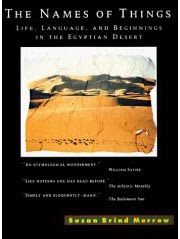
The Names of Things: Life, Language, and Beginnings in the Egyptian Desert by Susan Brind Morrow
I love this particular part of the book, where one day in Cairo Susan Brind Morrow went to the camel market and watched a group of tribesmen that came from the deserts of Sudan. They wore very fine layered white cotton and carried daggers sheathed in snakesin, and black wood canes. Their faces had "a quality of wildness about them" and she wanted to know these people, who somehow retained their fierce, quiet integrity amidst the chaos of Egypt. Packing very little, she set out to find them.
On the journey she met a Nubian man, Dr Hatikabi, who introduced himself as a poet. He drew her a map of Sudan, and taught her old Sudanese songs. I believe he taught her more than songs.
As he sang, tribesmen came and sat around us. I began to understand that year about trading poems and songs. It involved giving, that intangible, freeing human thing: giving something priceless, even to a stranger, for nothing.
I find this idea of a gift of songs incredibly moving. A gift, because it is so easily given, has no value and therefore priceless. The author would learn to trade songs later in other journeys -- trading Kazakh and Uighur songs for "You Go to My Head" and "Of Tomorrow Wasn't Such a Long Time".
Lyrics not as babel that divides, but as communion.
No comments:
Post a Comment